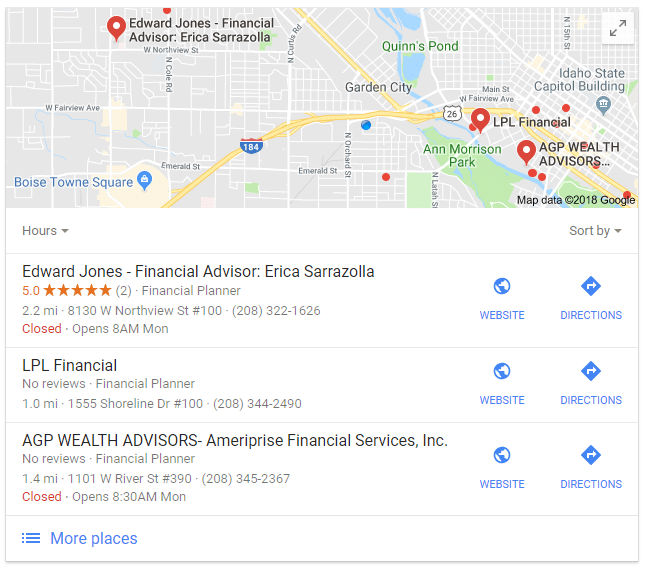Google Maps, the part of the search engine results page (SERP) dedicated to “local” solutions to the search query, has undergone major updates the past few years including:
- dropping from 7 listings to a 3 pack making ranking for local search much more competitive.
- switching from City-centric to Searcher-centric, meaning results are influenced by where the searcher is, rather than the center of the city
- emphasizing the proximity of the searcher to your business
- changing the location of the Local results on the SERP. It originally appeared by itself (or with ads) on the right-hand side of the page. It was then moved to the left-hand side with the other results and appeared as the top organic listing under the PPC ads. Now it can be found at different spots in the organic listings, sometimes still appearing at the top, but other times near the bottom of the page.
- adding a paid ad to some of the local listings.
- changing ranking factors so that Local Search optimization is more dependent on a combination of organic search and local search signals.
- increasing the number of keywords that the Google Map Pack appears for. Traditionally, the local pack only appeared for a few, very broad terms in each industry (i.e. Financial Planning, Financial Advisor, etc.), but it now can be triggered by a wide number of keywords depending on the situation.
Sample Google Maps 3-pack
Financial Keywords that Trigger Google Maps
These are the keywords that triggered the Map Pack for me for searches made within Boise. It is not a comprehensive list, but instead is a starting point designed to help advisors think about different possibilities for local keywords. As with everything “Google,” this list will continue to evolve and change over time, and may even differ from region to region.
Note, that I’ve used a generic [city] to indicate the use of your specific city.
Keyword followed by [City]
- financial planner, [city]
- financial advisor, [city]
- financial planning, [city]
- wealth management, [city]
- wealth manager, [city]
- wealth advisor, [city]
- investment management, [city]
- investment manager, [city]
- investment planning, [city]
- portfolio management, [city]
- retirement planning, [city]
- retirement income planning,[city]
- estate planning, [city]
- asset planning, [city]
- asset management, [city]
- insurance planning, [city]
- tax planning [city]
- business financial planning, [city]
Keyword By Itself
- financial planning
- financial planner
- financial advisor
- wealth management
- wealth advisor
- investment management
- investment manager
- retirement planning
- estate planning
- tax planning
- asset planning
- asset management
[City] followed by Keyword
- [city], financial planning
- [city}, financial planner
- [city], financial advisor
- [city], wealth management
- [city}, wealth manager
- [city], wealth advisor
- [city], investment management
- [city], investment manager
- [city], investment planning
- [city], portfolio management
- [city], retirement planning
- [city], retirement income planning
- [city], estate planning
- [city], asset planning
- [city], insurance planning
- [city], tax planning
- [city] business financial planning
As you compare searches using [city] before and after the search term, you see that the list is similar – so why include both sets of data here?
When I originally performed this research a couple of years ago, there were only 5 keywords that showed up with [city] listed before it.
This means that Google is getting better at identifying similar searches written in a different way.
So does it matter whether you list [city] before or after your primary keyword?
YES!
Even though Google recognizes both as being local and relevant to financial advisors, the SERPs sometimes show different results depending on whether [city] is listed before or after the main keyword. AND there may be a difference in search volume.
For example, the phrase “financial advisor, San Diego” is searched 390 times per month, whereas “San Diego financial advisor” is only searched 70 times per month.
What Does the Mean for You?
Searches for broad financial keywords, made from within your city, will often include the local pack in the search results, making it more important than ever that you’re optimized for Local Search. I generally recommend that these broad keywords be used for your web pages (i.e. homepage and service pages), then use longer-tail keywords for blog articles or other content that you create.
In addition, as Google’s search results are very specific to each phrase, you want to be very deliberate in your optimization choices.
Three advisors from your area are going to be included in the local search results – will you be one of them? With proper local and organic search engine optimization, you can be.
If you would like help optimizing your site for local or organic search, please schedule an introductory meeting, or visit our SEO services page for more information.
Brent is the owner of Advisor Rankings. He has an MBA in Financial Planning. specializes in SEO, and has been working with Advisors since 2009. In addition to this blog, he has contributed to Search Engine Journal, XY Planning Network, and other industry blogs. He has presented at NAPFA, FinCon, and XYPN.
- Brent Carnduffhttps://advisorrankings.io/author/brent/
- Brent Carnduffhttps://advisorrankings.io/author/brent/
- Brent Carnduffhttps://advisorrankings.io/author/brent/
- Brent Carnduffhttps://advisorrankings.io/author/brent/


